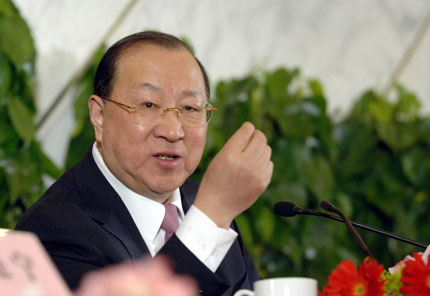
Finance Minister Jin Renqing speaks at a press conference in
Beijiing March 9, 2007. He said the unified corporate income tax rate for
domestic and foreign-funded enterprises would not dampen foreign
investors' enthusiasm in their China investment. [Xinhua]
 |
The draft corporate income tax law
is unlikely to cause a big financial burden to overseas-funded firms,
or dampen their investment enthusiasm, said Finance Minister Jin Renqing
Friday.
The draft bill, which has been submitted to the National People's Congress,
China's parliament, planned to unify the rate on domestic and overseas-funded
companies at 25 per cent. Under the current laws, the domestic firms are subject
to a 33 per cent rate while their overseas counterparts pay 25 per cent.
However, the draft offered a special treatment of 15 per cent rate for
high-tech companies, said Jin on the sidelines of annual session of the
parliament.
The minister revealed that the draft gave special consideration to Taiwan,
Hong Kong and Macao funded companies.
"Given that most of, roughly 60 per cent, the Taiwan, Hong Kong and Macao
funded companies are relatively small in scale, the draft specifically set a
rate of 20 per cent for small and low-profit enterprises," said Jin.
"As a result, a very limited number of enterprises will experience a hike to
25 per cent from 15 per cent," said the minister.
Moreover, a preferential grace period was incorporated in the draft,
according to Jin. For small companies, the increase to 20 per cent from 15 per
cent can be phased in during a course of five years, meaning a rise of just
one per cent per year, he elaborated.
The overseas firms are expected to pay 43 billion more in tax in an increase
to 25 per cent from 15 per cent, Jin estimated. However, considering the
granting of the five-year grace period, the burden will increase just 8 billion
per year, said he.
Therefore, he concluded that this, out of their rich profit, would not cause
great influences on them or dampen their interest in investing in China.
If passed, the law will be effective from January 1 next year, giving the
overseas firms a transition period, noted Jin.
The draft bill also encouraged energy saving and environmental protection by
granting favorable tax treatment to firms taking such initiatives, noted Jin.
"Necessary deductions can be made from their taxable income."
On the hotly debated oil tax, he promised that related preparations will be
sped up, but on the timing of its coming out, "the key is whether the conditions
are ripe."
The collection of oil tax is sure to be conducive to energy conservation and
environment protection, said Jin. However, it is mainly intended to streamline
the collection of fees related to the use of roads, including the road
maintenance fees, according to the minister.
Jin reaffirmed that China is in the process of establishing an investment
corporation to manage the country's ballooning foreign exchange reserve which
has topped one trillion US dollars.
The corporation will be under the supervision of the State Council, the
cabinet, instead of under the Minister of Finance, revealed the minister.
While the normal forex reserve will continue to be managed by the State
Administration of Foreign Exchange, the rest will be used to make certain
investments to get better gains, said Jin.
Experts estimated that US$700 billion is enough to provide a cusion for the
country's foreign trade needs.
